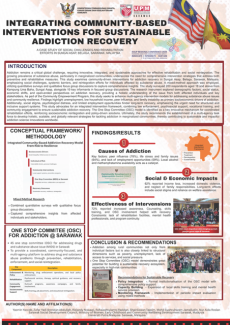Integrating Community-Based Interventions for Sustainable Addiction Recovery: A Case Study of Social Challenges and Rehabilitation Efforts in Sungai Asap, Belaga, Sarawak, Malaysia

Addiction remains a critical global challenge, requiring innovative, integrated, and sustainable approaches for effective rehabilitation and social reintegration. The growing prevalence of substance abuse, particularly in marginalized communities, underscores the need for comprehensive intervention strategies that address both preventive and rehabilitative measures. This study examines community-driven interventions for addiction recovery in Sungai Asap, Belaga, Sarawak, Malaysia, emphasizing social challenges, systemic barriers, and reintegration efforts for individuals affected by substance abuse.
A mixed-method approach was employed, utilizing quantitative surveys and qualitative focus group discussions to capture comprehensive insights. The study surveyed 200 respondents aged 18 and above from Kampung Uma Baha, Sungai Asap, alongside 10 key informants in focused group discussions. The research instrument explored demographic factors, social status, economic shifts, and open-ended perspectives on addiction recovery, providing a holistic understanding of the issue from both affected individuals and key stakeholders. As part of the Community Empowerment Program 2.0, this study seeks to enhance multi-agency intervention models for addressing substance abuse issues and community resilience.
Findings highlight unemployment, low household income, peer influence, and family instability as primary socioeconomic drivers of addiction. Additionally, social stigma, psychological distress, and limited employment opportunities hinder long-term recovery, emphasizing the urgent need for structured and inclusive support systems. This study advocates for an integrated intervention framework, combining law enforcement, psychosocial support, vocational training, and community engagement to ensure sustainable addiction recovery. The One Stop Committee (OSC) model is identified as a key innovative mechanism for coordinated rehabilitation efforts, reinforcing socioeconomic reintegration and policy-driven solutions.
Ultimately, the study recommends the establishment of a multi-agency task force to develop holistic, scalable, and globally relevant strategies for tackling addiction in marginalized communities, thereby contributing to sustainable and impactful addiction science innovations worldwide.
Keywords: Community, Interventions, Sustainable, Recovery, Addiction